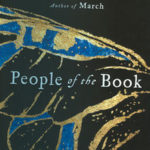 A Review of People of the Book, by Geraldine Brooke
A Review of People of the Book, by Geraldine Brooke
I was not familiar with the author, but I picked this book thinking it might have all the elements of a good bit of fiction. It’s a combination mystery, history, and treatise, promising to instruct on matters of medieval Jewish practice and religious custom with regard to holy text, in addition to what makes books rare and how one cares for them and interprets the age accreted to them. It’s a book that would seem to be particularly attractive to book-lovers, as opposed to merely lovers of subjects often covered in books.
On these points, People of the Book did not disappoint. But there is an overarching theme to all that, and you may like it, you may not. The overarching theme is this: that people of good will can override their differences and cherish what they have in common, even if they are from different faiths. What they may have in common is a shared reverence for the written word, and for the principles shared by religious traditions. That shared set of values may transcend religious differences, so much so that a Muslim preserver of antiquities may risk his life to preserve a significant Jewish text, in this case a Haggadah illustrated in defiance of customs prevailing at the time of its creation.
The book bounces among perspectives, and jumps backward to points in history when the book was threatened but saved by keepers of civilization intent on preserving what is good in us from the conflagrations that erupt from time to time among us. Then it jumps forward, again, to the protagonist and her struggles with her mother and with narrow-mindedness, and with her own tendencies to stand aloof from her fellow man, owing to her peculiar upbringing.
Throughout, the protagonist jet-sets around, with the author describing for us the international tensions existing here, there, and everywhere. There is an almost annoying buzz of all things international, like the mindless prattle of a Model UN club. You get it – we’re all the same, but at the same time we’re not, and the diversity of sights, sounds, and smells in the world add glamor and intrigue.
You might like this, or find it annoying as I did, but it’s not accidental. It’s in service to a larger diversity theme, the multi-culti ethos that we’re supposed to unthinkingly endorse. Sometimes the author is quite overt about it, as here:
[T]he book has survived the same human disaster over and over again. Think about it. You’ve got a society where people tolerate difference, like Spain in the Convivencia, and everything’s humming along: creative, prosperous. Then somehow this fear, this hate, this need to demonize ‘the other’ — it just sort of rears up and smashes the whole society. Inquisition, Nazis, extremist Serb nationalists . . . same old, same old. It seems to me the book at this point, bears witness to all that.
The character is speaking of the forces arrayed against survival of the Haggadah, the book which is the subject of this book, but I think the author intends to be speaking of this book, her own, as well. The author is giving us her view that lesser ideological differences, like those between Muslims and Christians and Jews, must yield to her higher humanist view, which ought to displace and supersede religious views. It is the point of view that religious conviction does not ultimately matter, compassion does. And understanding. Intellectual striving. Excellence in arts and letters. And deference to the credentialed elite who would rule us on these principles. Anything else is hate and fear.
This worldview is disturbing, to say the least, in large part because those who have it are so lacking in self-awareness. They don’t understand their own ideology as being an ideology. Anyone who doesn’t see reality their way is full of hate, fear, and the need to demonize “the other.” Those who disagree with her are, irony of ironies, the “other” themselves.
All that said, I mostly enjoyed the book. Perhaps you won’t find the authorial voice smarmy, as I did.
